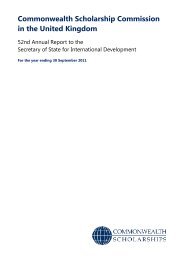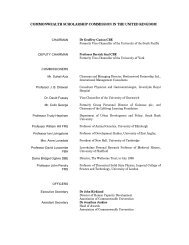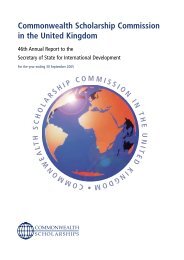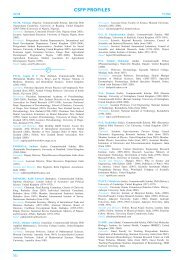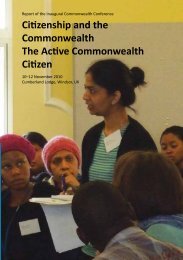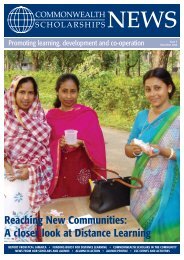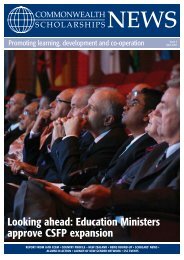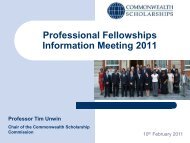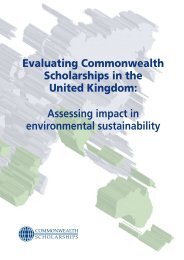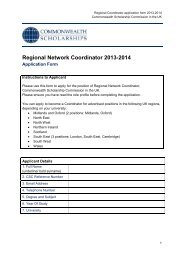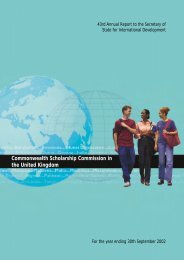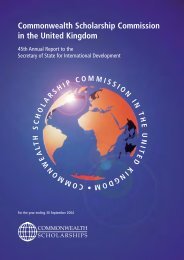Directory of Commonwealth Scholars and Fellows 1960 – 2002
Directory of Commonwealth Scholars and Fellows 1960 – 2002
Directory of Commonwealth Scholars and Fellows 1960 – 2002
You also want an ePaper? Increase the reach of your titles
YUMPU automatically turns print PDFs into web optimized ePapers that Google loves.
Preface<br />
Background to the CSFP<br />
The <strong>Commonwealth</strong> <strong>Scholars</strong>hip <strong>and</strong> <strong>Fellows</strong>hip Plan (CSFP) has been one <strong>of</strong> the most enduring outcomes <strong>of</strong><br />
<strong>Commonwealth</strong> collaboration in education. Since its establishment, at the first Conference <strong>of</strong> <strong>Commonwealth</strong><br />
Education Ministers in 1959, some 22,000 individuals have received awards under the Plan. Approximately 500<br />
more benefit each year. The Plan has developed into one <strong>of</strong> the best known <strong>and</strong> prestigious award schemes in the<br />
world.<br />
In retrospect, the CSFP founders showed great foresight, both in their decision to establish the Plan, <strong>and</strong> in the<br />
precise terms <strong>of</strong> reference given to it. In an age when, perhaps more than now, scholarship was valued for its own<br />
sake, the Plan objectives stressed the need for awards to be <strong>of</strong> practical benefit to the home country <strong>of</strong> the<br />
recipient. They stressed the need for flexibility, so that awards could include both short-term visits <strong>and</strong> high level<br />
academic study. Above all, they recognised that needs would change over time, <strong>and</strong> that the precise form <strong>of</strong><br />
awards should evolve to reflect this.<br />
What follows is the first published <strong>Directory</strong> <strong>of</strong> individual award holders. Its production is particularly timely for<br />
several reasons. First, it coincides with the 15th Conference <strong>of</strong> <strong>Commonwealth</strong> Education Ministers, <strong>and</strong> the first<br />
to take place in the United Kingdom since the Oxford Conference <strong>of</strong> 1959. We hope that, when Ministers come<br />
to debate the progress made by the Plan (which they have done at each <strong>of</strong> the intervening meetings), it will<br />
provide a uniquely rich source <strong>of</strong> data <strong>and</strong> inspiration.<br />
Second, it is fitting that the publication results from collaboration between Canada <strong>and</strong> the United Kingdom.<br />
Although the Plan was formally established at Oxford, it owed much <strong>of</strong> its origins to Canada. It was at the 1958<br />
Conference <strong>of</strong> <strong>Commonwealth</strong> Trade Ministers <strong>–</strong> the first <strong>of</strong> its type to be held in Canada <strong>–</strong> that the concept first won<br />
recognition. Prior to that it was Canadian universities that had been responsible for raising the concept with their<br />
national authorities. Since that time, the two countries have consistently been the most generous supporters <strong>of</strong> awards.<br />
Third, publication is timely because in recent years governments have taken a welcome interest in the extent to<br />
which scholarships can be measured against their objectives, <strong>and</strong> to which their impact can be enhanced by<br />
follow-up activity. To justify investment in scholarship schemes by ‘anecdote’ <strong>–</strong> in other words reciting details <strong>of</strong><br />
alumni who have risen to particular prominence <strong>–</strong> is no longer sufficient. We need both to know more about the<br />
career progression <strong>of</strong> much wider numbers <strong>of</strong> award holders, <strong>and</strong> find ways <strong>of</strong> engaging with them on a more<br />
regular basis. A directory <strong>of</strong> this type has a vital role to play in this process.<br />
Nature <strong>of</strong> the <strong>Directory</strong><br />
Before discussing what the contents <strong>of</strong> this <strong>Directory</strong> tell us about the CSFP, it is worth pausing to recognise some<br />
<strong>of</strong> its limitations. The pages that follow are not intended to give an accurate quantitative analysis <strong>of</strong> the<br />
subsequent careers <strong>of</strong> award holders. Nor, given the size <strong>of</strong> the task in tracing such a large <strong>and</strong> diverse sample,<br />
are they comprehensive.<br />
The <strong>Directory</strong> is divided into two sections. The first contains brief pr<strong>of</strong>iles <strong>of</strong> some 1,800 former award holders.<br />
This is not intended to be a ‘Who’s Who’ type <strong>of</strong> publication, which concentrates on the better-known <strong>and</strong><br />
prestigious alumni. Rather, we have included as many as possible <strong>of</strong> those who gave permission by the closing<br />
date <strong>of</strong> July 31st 2003.<br />
We cannot say with certainty whether the examples here represent an accurate ‘sample’ <strong>of</strong> all CSFP award<br />
holders. It might be argued that some categories are easier to trace than others, <strong>and</strong> that this could lead to a bias.<br />
Those working in particular pr<strong>of</strong>essions, such as academic life, might have their careers more fully documented<br />
than others, as might those working in particular geographical regions. Those who have reached the very top <strong>of</strong><br />
their pr<strong>of</strong>ession might also be more in the public eye than others, although this does not necessarily mean, <strong>of</strong><br />
course, that such categories are more likely to participate!<br />
vii



